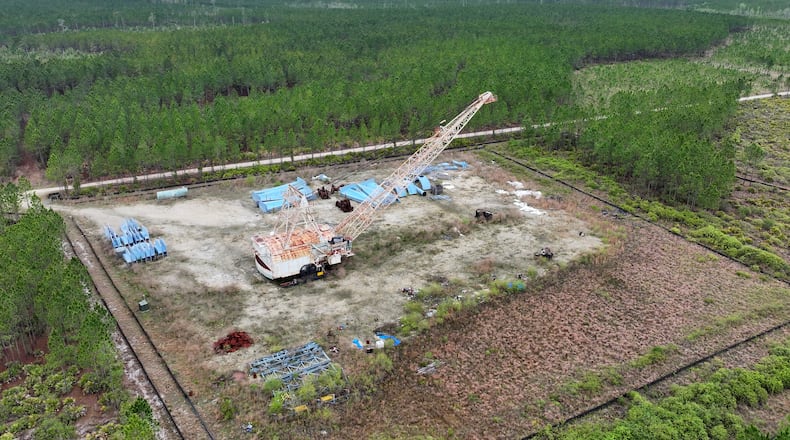Georgia environmental regulators could decide any day now whether to clear an Alabama-based company to mine next door to Georgia’s famed Okefenokee Swamp.
Now, a pair of bills that would prevent mining from expanding near the swamp has been introduced at the Georgia General Assembly, reviving a push to protect the ecosystem after previous attempts fizzled.
Both bills were introduced last week by Rep. Darlene Taylor, R-Thomasville, who has championed past legislation concerning the Okefenokee, North America’s largest intact freshwater wetland. The bills are also sponsored by Rep. Ron Stephens, R-Savannah, Rep. Steven Sainz, R-St. Marys, and Rep. Debbie Buckner, D-Junction City, along with several others.
The Georgia Environmental Protection Division is weighing permits for a mine planned by the firm Twin Pines Minerals. The company is seeking permission from EPD to dig titanium sands from a 584-acre tract of Trail Ridge, a line of sand dunes on the Okefenokee’s eastern flank considered key to the swamp’s hydrology.
Credit: HYOSUB SHIN / AJC
Credit: HYOSUB SHIN / AJC
Twin Pines has called its project a “demonstration mine,” but the company owns thousands more acres on Trail Ridge and could seek to expand. Other large landowners in rural Charlton County on the swamp’s east side have also expressed interest in allowing mining on their land.
Just over a year ago, EPD released draft permits for the project, which has faced opposition from environmentalists, outside scientists and the federal government.
Neither bill would stop the Twin Pines mine as it’s currently proposed from receiving final permits from EPD. But they would prevent expansion or consideration of future mines on Trail Ridge — at least temporarily.
The first piece of legislation, the Okefenokee Protection Act (House Bill 561), would prohibit EPD from issuing, modifying or renewing any mining permits on Trail Ridge after July 1. The bill is nearly identical to legislation proposed in past sessions that had bipartisan backing but failed to move through the state House of Representatives.
The second bill, House Bill 562, would prevent EPD from considering new permits for mines on Trail Ridge or tweaking existing ones until mid-2030.
HB 562’s proposed five-year moratorium is slightly broader than one considered by the Legislature last session, which would have paused permitting for three years, but only for certain types of mines. That measure cleared the House but did not receive a vote in the Senate on the session’s final day.
Credit: HYOSUB SHIN / AJC
Credit: HYOSUB SHIN / AJC
Twin Pines President Steve Ingle said the company opposes the new legislation, arguing the company has “every right to mine our property, so long as the mining can be done safely without hurting the swamp.”
“EPD will not issue a permit if it is not safe,“ Ingle added in his statement. ”Our opponents resorting to legislation, rather than attempting to substantiate the talking points they have used to oppose our project, speaks volumes about the merits of their position.”
Environmental groups, meanwhile, said they back the proposals and called on lawmakers and Gov. Brian Kemp to do the same.
Rena Ann Peck, the executive director of Georgia Rivers, said in a statement that the bills “provide the opportunity for all the legislators and leadership to respond to their constituents to save the Okefenokee National Wildlife Refuge from mining.”
It was not immediately clear what either bill’s odds are to make it to Kemp’s desk. Crossover Day in the General Assembly is roughly a week and a half away, and any bill that has not cleared at least one legislative chamber is typically considered “dead” for the session.
Both pieces of legislation have been assigned to the House Committee on Natural Resources and Environment led by Chairman Lynn Smith, R-Newnan. As of late Monday afternoon, neither bill had been scheduled for a hearing in the committee. Smith did not respond to a question about whether they’ll receive one.
House Speaker Jon Burns said in a statement that protecting the Okefenokee “is important not only for Georgia, but for our entire country.”
Burns did not directly respond to a question about whether he supports the legislation, but he expressed optimism that the mining controversy can be resolved.
“We remain hopeful that those involved with this issue on the private side will reach a solution that strikes a balance between the private property rights of the landowners and the need to protect the natural habitat of this national treasure,” Burns said.
A spokesman for Kemp declined to comment, saying the governor’s office does not weigh in on proposed or pending legislation.
About the Author
Keep Reading
The Latest
Featured






